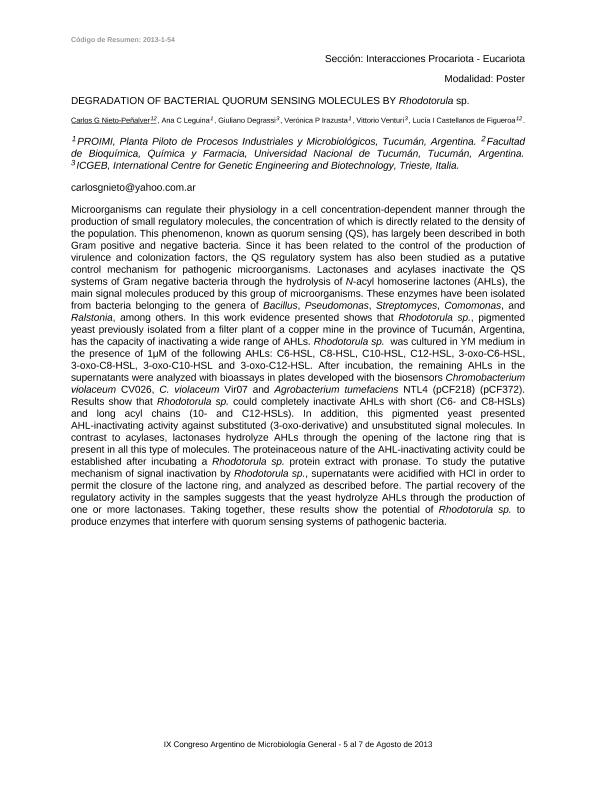Evento
Degradation of bacterial quorum sensing molecules by Rhodotorula sp.
Nieto Peñalver, Carlos Gabriel ; Leguina, Ana Carolina del Valle
; Leguina, Ana Carolina del Valle ; Degrassi, Giuliano; Irazusta, Verónica Patricia
; Degrassi, Giuliano; Irazusta, Verónica Patricia ; Venturi, Vittorio; Castellanos, Lucia Ines
; Venturi, Vittorio; Castellanos, Lucia Ines
 ; Leguina, Ana Carolina del Valle
; Leguina, Ana Carolina del Valle ; Degrassi, Giuliano; Irazusta, Verónica Patricia
; Degrassi, Giuliano; Irazusta, Verónica Patricia ; Venturi, Vittorio; Castellanos, Lucia Ines
; Venturi, Vittorio; Castellanos, Lucia Ines
Tipo del evento:
Congreso
Nombre del evento:
IX Congreso Argentino de Microbiología General
Fecha del evento:
05/08/2013
Institución Organizadora:
Sociedad Argentina de Microbiología General;
Título del Libro:
Libro de resúmenes del IX Congreso Argentino de Microbiología General
Editorial:
Sociedad Argentina de Microbiología General
Idioma:
Inglés
Clasificación temática:
Resumen
Microorganisms can regulate their physiology in a cell concentration-dependent manner through the production of small regulatory molecules, the concentration of which is directly related to the density of the population. This phenomenon, known as quorum sensing (QS), has largely been described in both Gram positive and negative bacteria. Since it has been related to the control of the production of virulence and colonization factors, the QS regulatory system has also been studied as a putative control mechanism for pathogenic microorganisms. Lactonases and acylases inactivate the QS systems of Gram negative bacteria through the hydrolysis of N-acyl homoserine lactones (AHLs), the main signal molecules produced by this group of microorganisms. These enzymes have been isolated from bacteria belonging to the genera of Bacillus, Pseudomonas, Streptomyces, Comomonas, and Ralstonia, among others. In this work evidence presented shows that Rhodotorula sp., pigmented yeast previously isolated from a filter plant of a copper mine in the province of Tucumán, Argentina, has the capacity of inactivating a wide range of AHLs. Rhodotorula sp. was cultured in YM medium in the presence of 1μM of the following AHLs: C6-HSL, C8-HSL, C10-HSL, C12-HSL, 3-oxo-C6-HSL, 3-oxo-C8-HSL, 3-oxo-C10-HSL and 3-oxo-C12-HSL. After incubation, the remaining AHLs in the supernatants were analyzed with bioassays in plates developed with the biosensors Chromobacterium violaceum CV026, C. violaceum Vir07 and Agrobacterium tumefaciens NTL4 (pCF218) (pCF372). Results show that Rhodotorula sp. could completely inactivate AHLs with short (C6- and C8-HSLs) and long acyl chains (10- and C12-HSLs). In addition, this pigmented yeast presented AHL-inactivating activity against substituted (3-oxo-derivative) and unsubstituted signal molecules. In contrast to acylases, lactonases hydrolyze AHLs through the opening of the lactone ring that is present in all this type of molecules. The proteinaceous nature of the AHL-inactivating activity could be established after incubating a Rhodotorula sp. protein extract with pronase. To study the putative mechanism of signal inactivation by Rhodotorula sp., supernatants were acidified with HCl in order to permit the closure of the lactone ring, and analyzed as described before. The partial recovery of the regulatory activity in the samples suggests that the yeast hydrolyze AHLs through the production of one or more lactonases. Taking together, these results show the potential of Rhodotorula sp. to produce enzymes that interfere with quorum sensing systems of pathogenic bacteria.
Palabras clave:
quorum sensing
,
Rhodotorula sp
Archivos asociados
Licencia
Identificadores
Colecciones
Eventos(PROIMI)
Eventos de PLANTA PILOTO DE PROC.IND.MICROBIOLOGICOS (I)
Eventos de PLANTA PILOTO DE PROC.IND.MICROBIOLOGICOS (I)
Citación
Degradation of bacterial quorum sensing molecules by Rhodotorula sp.; IX Congreso Argentino de Microbiología General; Rosario; Argentina; 2013; 1-1
Compartir



